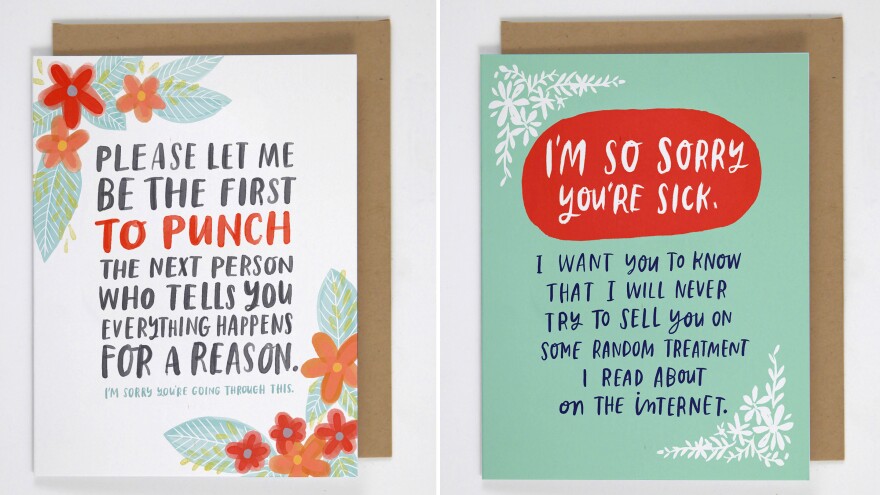When a friend or loved one gets sick — really, seriously sick — it's hard to know what to say. So some of us say nothing. Which seems better than saying the wrong thing, though people do that too.

Los Angeles graphic designer Emily McDowell's solution to this dilemma are what she calls Empathy Cards. When someone is seriously ill, she says, the usual "Get Well Soon" won't do. Because you might not, she says. At least not soon.
McDowell knows this from experience. She's a 15-year survivor of Hodgkin lymphoma. She was just 24 when she was diagnosed.
"The most difficult thing about my illness was the fact that it was so lonely," she says. One of the reasons was "friends and family either disappearing because they didn't know what to say or well-intentioned people saying the wrong thing. So one of the most difficult things about being sick was feeling really alienated from everyone that I knew."
McDowell says she often got well-meaning advice on Internet "cures." "The thing that I felt when it was happening to me was: 'I also have the Internet. And I really appreciate you trying to help, but believe me, I've spent way too many hours Googling my own condition and any possible treatments. And I've made the decisions to do the things that I'm doing because I felt like they were the best choices for me.' "

And then there's "Everything happens for a reason." With time and distance, some people do come to that conclusion on their own, McDowell says. But "hearing that immediately after some shocking or terrible thing happens in your life is generally not what people want to hear."
What is it with people who respond to the news of your dire prognosis with more bad news? That was the impetus for "When life gives you lemons, I won't tell you a story about my cousin's friend who died of lemons."
"This is a weird thing that people do. When they found out ... that I had cancer, it was 'Oh yeah, so and so I know had cancer and they died.' ... It's like sort of knee-jerk 'Oh, I can relate to this' and then they don't really think about the ending. ... But it's really surprising how many people this happens to and how common that is as a reaction."
And wouldn't it be great if no one ever referred to your illness as a "journey"? "With time and distance some people do come to that conclusion on their own that this ... feels like a journey," McDowell says. "But a lot of people really feel like 'If this is a journey I'd like my ticket refunded,' or 'This is a journey to hell and back.' "
Copyright 2020 NPR. To see more, visit https://www.npr.org.



